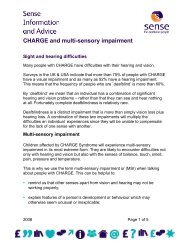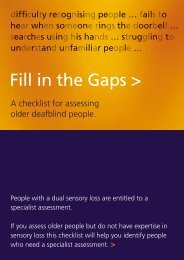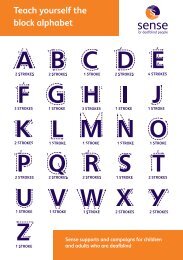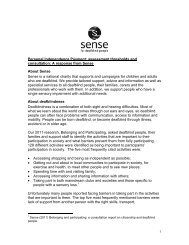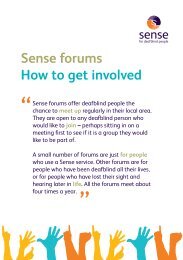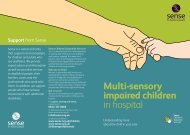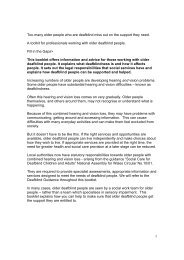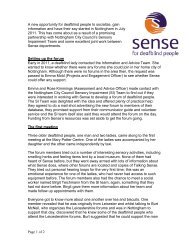MSI Unit Curriculum - Sense
MSI Unit Curriculum - Sense
MSI Unit Curriculum - Sense
You also want an ePaper? Increase the reach of your titles
YUMPU automatically turns print PDFs into web optimized ePapers that Google loves.
<strong>MSI</strong> <strong>Unit</strong> <strong>Curriculum</strong>: Phase 1Environments which provide immediate, amplified feedback about pupils’actions (for example, resonance boards, Little Rooms) are used when appropriatewith support from familiar staff.Pupils are given the opportunity to become aware of new activities beforethey are asked to join in with them. To do this, staff work in close proximity topupils, perhaps with an arm touching the pupil’s arm, but do not ask the pupilto participate in the activity. Once pupils tolerate this approach, staff begin towork coactively, with adult and pupil working as one. Staff respond to pupils’non-verbal signals and do not force pupils through activities unless these aremedically necessary.As pupils become more confident within familiar daily routines, staff begin towork co-operatively rather than coactively, with pupil and adult contributingjointly to the activity but not always using identical actions.Responses to routines and changesPupils need the security of familiar keyworkers, routines and environments.In other situations they are likely to be passive, self-absorbed or distressed.Pupils follow daily, rather than weekly, timetables, with each day followinga similar pattern. The aim is for pupils to recognise routines and to begin toperceive their world as patterned and predictable.Each activity within the daily timetable follows a consistent pattern each timeit occurs. The beginnings and endings of activities are emphasised by the use ofORs or other cues, emphatic verbal and non-verbal signals from keyworkers and ifappropriate a brief pause (some pupils will not find a pause helpful).Frequently-performed routines (for example, feeding, changing) are carried outin the same way each time, by the same adult/s and in the same place. If oneelement has to change (for example, because of staff illness), others are kept thesame. Cover staff are fully briefed so that they can carry out routines in exactlythe same way.Pupils work throughout the day with main (and support) keyworkers, whosepriority is to establish a secure relationship with the pupil. As part of this, eachkeyworker develops individual interactive routines which the pupil enjoys (forexample, singing and rocking /massage routines / play with a favourite blanket).These routines very gradually increase in complexity, with additional steps beingadded as the pupil’s understanding grows.31




